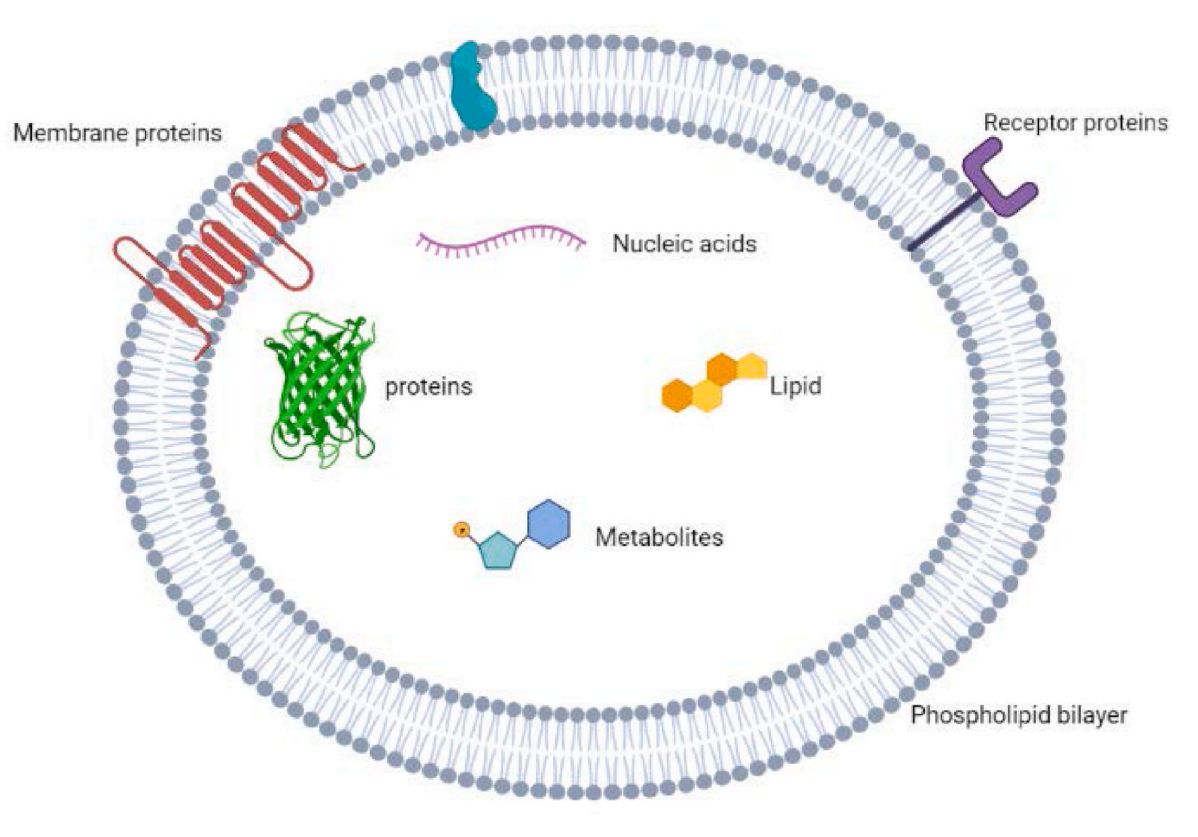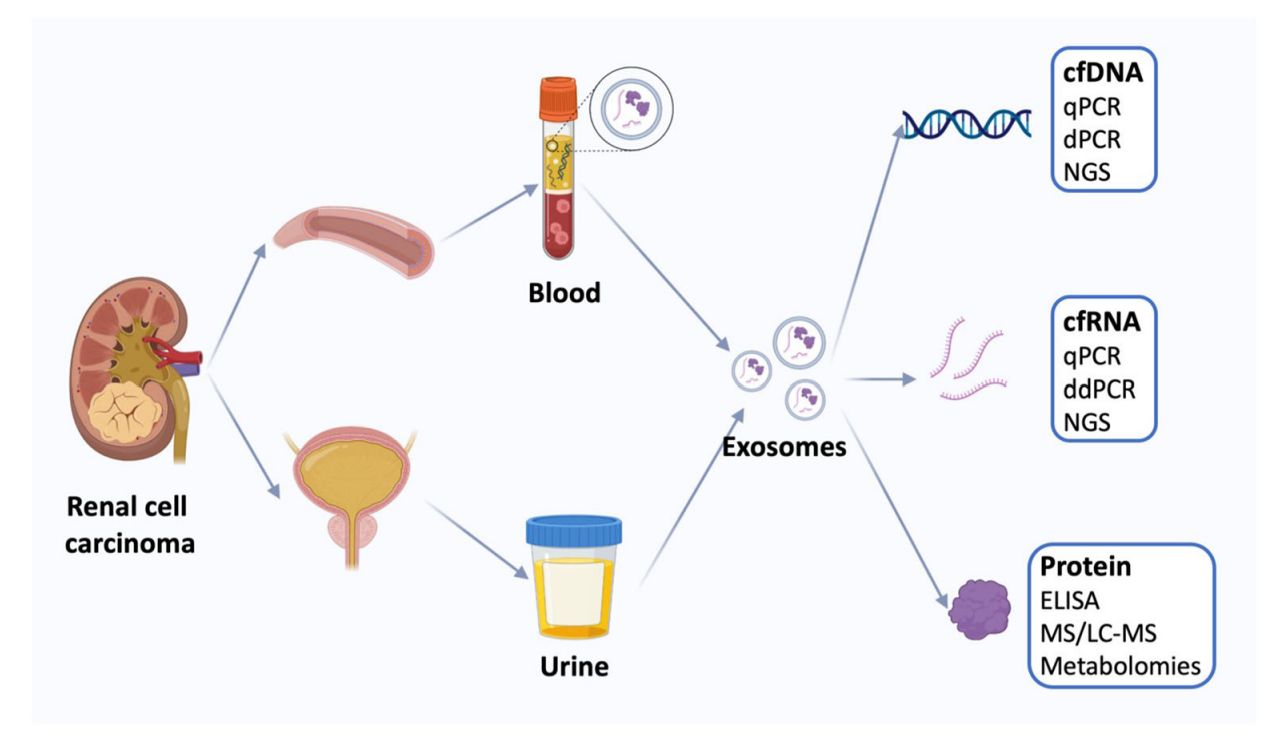Exosome Research in Human Kidney Cancer
Exosomes are nanoscale vesicles secreted by cells, which contain a variety of biologically active components, including microRNAs, mRNAs, and proteins, and are an important class of intercellular communication molecules. Studies have confirmed that exosomes play an important role in tumorigenesis, metastasis, and drug resistance. Exosomes are widely present in the blood, urine, and other body fluids, and have great application prospects in the pathogenesis, diagnosis, and treatment of urological malignant tumors such as kidney cancer.
 Figure 1. Schematic of the structure and contents of exosomes. (Razavinia A, et al., 2024)
Figure 1. Schematic of the structure and contents of exosomes. (Razavinia A, et al., 2024)
Exosomes and the Progression of Kidney Cancer
- Involvement in Tumor Microenvironment Construction
Exosomes exhibit certain organ and tissue cytophilic characteristics, and this predisposition is related to the expression of integrins on the surface of exosomes. The combination of exosomes secreted by cancer cells and stromal cells of target organs is involved, leading to the reprogramming of target cells and the activation of important signaling pathways, and ultimately the target organ establishes a pre-metastatic microenvironment for tumor metastasis, which provides the prerequisites for tumor metastasis.
- Contribute to Angiogenesis
miRNA from exosomes secreted by tumor cells can be transferred to endothelial cells to promote the expression of vascular endothelial growth factor (VEGF), fibroblast growth factor (FGF), and angiopoietin-1 to accelerate the reconstruction of the vascular network in tumor tissues. In addition, exosomes with high expression of carbonic anhydrase IX are associated with vascular reconstruction in kidney cancer. The establishment of a vascular network is not only crucial for the normal growth of tumor tissues but also provides an important channel for tumor invasion.
- Contributing to Immune Escape
The exosomes secreted by kidney cancer cells can induce T cells to generate immune responses as well as trigger apoptosis of activated T lymphocytes through activation of the caspase pathway, attenuating the cytotoxicity of natural killer cells, which contributes to immune escape and promotes the development of kidney cancer. It has been found that Hsp70 is abundant in kidney cancer exosomes, which can aggregate tumor growth factors and pro-inflammatory cytokines, induce the expression of MDSCs, and thus promote tumor growth.
- Involved in Cancer Cell Invasion and Metastasis
Exosomes can alter the function of target cells through the substances they carry, in which tumor-derived exosomes cause epithelial-mesenchymal transition after acting on uroepithelial cells, which is an important step in tumor metastasis. In addition, miRNAs released by exosomes are transferred to vascular endothelial cells, leading to an increase in vascular permeability and promoting tumor metastasis.
Our exosomal products of kidney cancer origin are listed below.
| Cat No. | Product Name | Source |
| Exo-HDBF-18 | HQExo™ Exosome-SDH-Kidney Cancer Plasma exosome | Exosome derived from Single Donor Human Kidney Cancer Plasma |
| Explore All Exosomes Isolated from Human Kidney Cancer Plasma | ||
Exosomes in the Diagnosis of Kidney Cancer
Various substances contained in exosomes represent the pathophysiological state of donor cells, therefore, the isolation and detection of exosomes have good application prospects in the diagnosis, treatment, and monitoring of prognosis of kidney cancer.
 Figure 2. Liquid biopsy of renal cell carcinoma. (Rui R, et al., 2023)
Figure 2. Liquid biopsy of renal cell carcinoma. (Rui R, et al., 2023)
- Long Stranded Non-coding RNA (lncRNA)
Malignant tumor cells can express specific lncRNA markers, suggesting that lncRNAs can be used as disease-specific markers, which is important for cancer diagnosis. Similar to miRNAs, lncRNAs also play an important role in the growth, proliferation, invasion, and metastasis of cancer cells. Urinary exosomal lncRNAs NR-040448 and NR-033390 are the most obviously differentially expressed, suggesting that lncRNAs can be used as potential diagnostic markers for kidney cancer.
- Micro RNA (miRNA)
MiRNAs are involved in almost all known processes of tumorigenesis and development. Urinary miRNAs can be derived from various tissues and organs of the urinary system, including tumor tissues, uroepithelial tissues, and renal parenchyma. Urine miR-126-3p combined with miR-449a assay can distinguish healthy individuals from patients with renal cell carcinoma (RCC) and can be used as a marker for highly sensitive clear cell RCC.
- Protein
Proteins from both normal individuals and renal cancer patients are obtained by isolating their urinary exosomes. Among them, matrix metalloproteinase 9, CA IX, and podocalyxin are expressed at an increased level in the urinary exosomes of renal cancer patients compared to normal subjects and may serve as potential renal cancer markers.
Exosomes in Kidney Cancer Therapy
- Drug Carrier
Because the membrane structure of the lipid bilayer can protect the RNA in exosomes from degradation, and it is easier to cross the biological membrane and easily deliver the therapeutic genes to the target cells accurately, exosomes can play a role in therapy as drug carriers. The anti-tumor substances carried by exosomes can not only hinder the development of bladder cancer but also have no significant damage to the normal urinary tract epithelium.
- Tumor Vaccine
Compared with traditional vaccines, exosomes derived from tumor cells have higher affinity and lower immunogenicity. Interleukin-12-anchored renal cancer cell-derived exosomes are found to have more significant anti-tumor effects than normal exosomes, and this novel vaccine is found to have a stronger cytotoxic response in in vitro experiments, which provides strong evidence for the treatment of renal cancer with exosome vaccines.
- Tumor Resistance
Tumor resistance is one of the main reasons for the failure of clinical treatment of tumors. Exosomes can mediate the development of drug resistance in tumor cells, which can not only provide new therapeutic targets for tumor patients but also predict the responsiveness of patients to anti-tumor drugs through the detection of exosomal markers, which can provide an important reference for the individualized treatment of kidney cancer.
Creative Biostructure is committed to helping clients investigate the use of exosomes in the diagnosis and treatment of kidney cancer. Our team of experts has developed innovative technologies to isolate and characterize kidney cancer-derived exosomes, providing clients with unique opportunities to delve into the molecular characterization and function of the biomarkers.
By leveraging the diagnostic and therapeutic capabilities of exosomes, we enable our partners to enhance early detection, improve risk stratification, and develop targeted treatment strategies for kidney cancer. From cutting-edge proteomics and genomics analyses to the design of exosome-based drug delivery systems, we offer tailored solutions to our clients. Feel free to contact us for a formal quote.
References
- Razavinia A, et al. Exosomes as novel tools for renal cell carcinoma therapy, diagnosis, and prognosis. Heliyon. 2024. 10(12): e32875.
- Rui R, et al. Advances in the research of exosomes in renal cell carcinoma: from mechanisms to applications. Front Immunol. 2023. 14: 1271669.